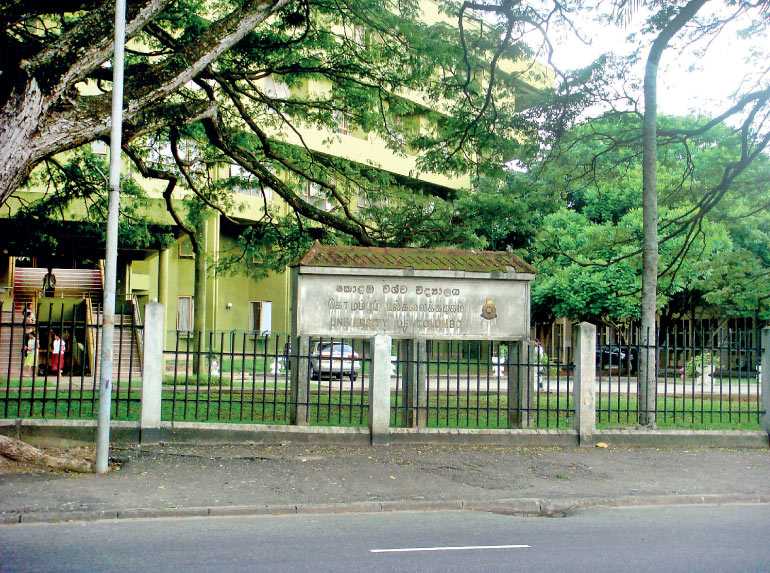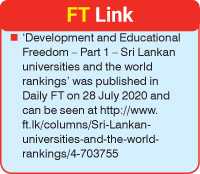Friday Feb 13, 2026
Friday Feb 13, 2026
Thursday, 13 August 2020 00:00 - - {{hitsCtrl.values.hits}}

The problem of not having internationally recognised universities could be attributed to academics and professionals, not the Government or politicians
Three recently published articles on higher education in Sri Lanka deserve close scrutiny. One was written by Prof. R. P. Gunawardane on ‘Proposal to establish 10 universities’ and it was published in Colombo Telegraph on 20 June. The second article, published in Daily FT on 8 July, was written by Prof. Nalin Abeysekera on ‘Sri Lankan university ranking’. Recently, Dr. Sujata Gamage wrote on ‘Public university funding’ and it was published in Daily FT on 10 July. All articles were high quality with a range of recommendations.
Prof. Gunawardane basically does not support establishment of new universities but recommends improvements to the existing universities by setting up ‘Instrumentation Centres’ which are to be accessible by all universities. He suggests the establishment of links with prestigious foreign universities and research institutes to facilitate the exchange of student and academic staff. Further, he recommends the establishment of Centres of Excellence by promoting each university concentrating on a targeted single academic discipline.
Prof. Abeysekera suggests educational reforms to produce graduates with entrepreneurship skills and request the universities to define their role to position in the world rankings. Prof. Abeysekera highlights the low research spending per capita in Sri Lanka and he implies that high quality teaching is more important to cater to local needs.
Interestingly, Dr. Gamage highlights the unbalanced heavy public fund allocations to the higher education sector now and demands more funds for school education. She suggests that the 90% of youth who are not selected to follow university education must be looked after. Further, Dr. Gamage believes that the products of Sri Lankan university system do not contribute significantly to the development of the Sri Lankan economy.
The intentions of all above experts are positive. I am not an educational scientist. However, as a professional, who tasted higher education in Sri Lanka and in the developed world, I look at this holistically and try to find avenues to get the best out of what we got. Again, I go back to the ‘development’ concept described in Part 1 of this article.
Every citizen has the right to enjoy educational freedom. To provide this freedom, a government need to facilitate quantitatively and qualitatively. First, there should be enough number of educational establishments, private or public to cater to the demand. Second, these educational establishments must deliver quality education. Hence, I do not rule out the proposal of establishing more universities, just because we cannot maintain acceptable quality.
Just assume that the residents of a remote village request the Government to establish a school for their kids. Suppose, the Government decides not to establish a base school there at least with minimum facilities, citing not enough funding to establish a quality school like the one in the nearby town, I wouldn’t dare to print language the residents would use as the response.
Quality is an important but a relative status and an educational entity needs time to lift quality to an acceptable quality benchmark. This is why our best universities are ranked low in the world ranking. However the issue is that our Universities are crawling rather than walking, in terms of continuous development. First, we have to find a way to walk. Our aim is to be in the path towards academic excellence.
I am with Prof. Gunawardane’s suggestion to promote each university to become Centres of Excellence and his suggestion to have international collaboration. This is where I do not agree with Prof. Abeysekera’s suggestion on producing graduates with belongingness, in other words, in line with local needs. In my view, we have to break ‘our island and our needs’, frog in the well, mentality. We have to start thinking globally but acting locally.
Dr. Gamage’s suggestion on spending more money on school education is in line with the strategies adopted by the developed countries. However, in developed countries, universities have various sources of funding, in addition to the government funding. It includes patent revenue, international student fees and research grants from the private sector. In Sri Lanka, the higher education sector must rely upon sole Government support.
The question is not about the amount of money, but about getting the value out of the money spent. Hence, the solution is with the academics of universities and educational professionals rather than with the government. A government should not punish prospective students for the failure of academics, by reducing funding which will in turn reduce the number of student placements.
I personally believe that our industrial and service sectors are not yet ready to accommodate more influx from TVET (Tertiary and Vocational Education and Training) sector or from secondary school. What we need is to improve the quality of current output, then, they can seek even foreign clients to provide services to earn forex for Sri Lanka. Hence, before finding a new formula for allocating funds for each education sector, we must concentrate on how to achieve the best value for the money spent now.
We have to view the Government as an investor. An investor would not invest, if the borrower could not prove the existence of a business plan and also if there is no assurance of quality returns to the investor. Blindly pumping money to a bottomless business has disastrous consequences.
I agree with Dr. Gamage’s suggestion on the need of proper assessment of the performance of Universities and the quality of outputs. However I judge them against the international benchmarks rather than the local benchmarks because Sri Lanka’s future lies on its ability to provide international quality services. Our affordable clients would be in developed countries. As a small country, Sri Lanka’s natural resources and production capacities are comparatively low in quantity to be a global force reckoned with.
The selling of human capital; the brain power is the viable option for us to survive in the global market. In the current technological setting, your workplace location is immaterial. In future, the majority of professionals would work from home and serve digitally connected global clients. This is what COVID-19 taught us bitterly. You must be ready to work from remote locations. We have to produce internationally recognised graduates. We need a strategic plan for this, follow the plan meticulously and must be ready to improve it continuously.
Strategy towards academic excellence
Outcome based education: ‘The Washington Accord’ is an international agreement between bodies responsible for accrediting engineering degree programs. In 1989, this was signed by Australia, USA, UK, New Zealand, Canada and Ireland. Until 2014, Sri Lanka was a provisional signatory. Currently, twenty countries in the world are full-right signatories of the agreement. Sri Lanka obtained full rights in 2014 after making significant changes to the Engineering Degree programs delivered by public universities.
One of the major changes was to convert the traditional academic syllabuses into the outcome based academic programs. One can imagine why it took almost 25 years for this change. Initially, our academics might have rejected this kind of change as the holders of then engineering degrees were individually assessed and accepted by the developed countries to offer the membership of respective professional institutions.
There were two flaws in that basis. The world looks at the systems excellence rather than the individual brilliance. The other issue was that the world never stopped improving while we were stagnant and failing to embrace the continuous educational improvement elements. So, we were lagging behind and the gap started widening. So, the Institution of Engineers, Sri Lanka had to insist on the educational authorities to act decisively to introduce outcome-based elements to the engineering degree syllabuses.
Consequently, from 2014 onwards, Engineering degrees from public universities were mutually recognised by the other 19 signatory countries. It should be noted here that this was not a project, but a journey. Our engineering academics must improve continually and introduce more and more outcome based elements to the engineering degree programs otherwise at the next assessments cycle, we may lose the accreditation.
In developed countries outcome based education has been introduced to all educational sectors. Outcome based education “…starts with a clear specification of what students are to know, what they are to be able to do, and what attitudes or values they should be able to demonstrate at the end of the program” (Killen, R. Programming and Assessment for Quality Teaching and Learning – 2005)
In this methodology, the levels of learning are determined through continual assessment of student performance rather than assessing at the end of the term examination. Award of credits to the students are in accordance with the ‘level’ of learning. Even in this system, still end of term examinations are held to check the students’ knowledge on basic principles of the subject, but the examination marks are only a percentage of total marks on offer. The rest comes from the continual assessments. If Sri Lankan Universities want to be placed on the path towards academic excellence of international standard, all University degree programs must be transformed into outcome based academic programs.
Teaching quality: In Australia, if anyone wants to be a teacher, he/she must follow a Diploma in Education. You may have PhD; still you need to have the Diploma in Education to teach a student. Compare this with Sri Lanka. The brightest students who earn Honours Degrees with First Class or Second Upper Class levels are selected as Assistance Lecturers. Thereafter, they follow Masters Degrees or Doctor of Philosophy (PhD) to become a lecturer. Over time, with experience and academic works, they would gradually become senior lecturers and professors, etc.
Teaching is an art. It has a scientific base as a human teaches another human; irrespectively both are completely different in character and at different emotional intelligence levels. Hence, the teacher must understand how other human beings behave and how to transfer knowledge from one to another during teaching process. This is why during our whole academic life, we find some teacher who cannot teach. This is why, in developed countries, teachers are taught how to teach. Hence, having a Diploma in Education must be compulsory for Sri Lankan university dons.
Research capability: Traditionally, Sri Lankans academics give low priority to research activities. One reason for this is due to the flawed selection criteria of academics. Majority academics in the university system have no hands-on experience in industry sectors or in services sectors. Straight from the university graduation, they become lecturers based on theoretical academic excellence. They are brilliant in theoretical knowledge but lack in how theories work on ground.
If there is a requirement that all such academics should spend at least five years in an industry or a service sector before joining Universities as assistant lecturers, their overall research and teaching quality would be immensely improved. This understanding will inspire students to do quality research. This kind of experience will improve lecturer’s ability to answer students’ probing questions.
Currently, there are many university study courses without research component. Even, in the courses which have research projects such as engineering, the scopes of research projects are alarmingly narrow and these projects are usually extension of already known theories. The students are not serious about the research projects. Usually, the supervisor and students jointly write an academic paper and publishes it to fulfil the requirement of number of published papers for the supervisor to meet his/her performance indicators.
The majority of such “research” papers would not be acceptable for publishing in international peer reviewed journals. This is why when international ranking systems are applied to research works in local universities, low ratings are given to our research outputs. No wonder Sri Lanka still seeking a Nobel laureate. If we continue like this, we will be chasing this for the next 100 years as well. My apology to individually brilliant research dons.
Quality of research must be uplifted to the international level, if anyone dreams to uplift our universities to the international level. The first and foremost action should be to bring the management of Sri Lanka’s all Governmental research organisations under one roof and under one authority. Research laboratories can be located at various geographical locations. Then, this research authority must establish direct links with all public universities and also with Government services sectors and private industrial sectors.
Research funding, major research sponsorship, peer reviewing of major research papers, coordination of publishing of research papers in international journals must be handled by this authority. This authority must develop Key Performance Indicators and benchmarks for the university academics to comply with. The University Grant Commission must use these KPIs and BMs for approving promotions of academics. This is how a research authority can play a vital role to find solutions to the national problems.
To increase the quality of research, as Prof. Gunawardane suggested, the Universities must establish links with prestigious foreign universities and research institutes to facilitate the exchange of student and academic staff. In the long run, each university can select their own favourite discipline to become Centres of Excellence as suggested by Prof. Gunawardane.
Visibility and presence: If others don’t know what you do, your contribution will not be recognised. If we ask top 500 eminent academics in the world to name top 500 universities, what is the chance of them naming one of Sri Lankan universities? I would say ‘nil’. This is why visibility matters whether we like ‘survey’ as the assessment method or not.
In this technological age, good websites are important for telling the world what the universities do and have achieved so far. Such websites attracts enquiries from eminent academics of the world. It attracts prospective fee-paying students. It attracts research funding from the private sector. Most importantly, it drives government direction and policy changes.
In my view, all Sri Lankan universities must develop international quality professional websites which could provide details on academic courses, syllabuses, details of academics, their research papers with abstracts, statistics of graduates, details of former graduates who are in prominent places in the world, business plans, achievements, etc. This list goes on.
 Final thoughts
Final thoughts
In my view, the problem of not having internationally recognised universities could be attributed to academics and professionals, not the Government or politicians. If the academics and the professionals could develop a long-term strategy to direct our universities towards the path of internationally-recognised academic excellence, any government would allocate funds because the society will force the government to do so if the government wants to be in power. It is about educational freedom.
(Eng. Janaka Seneviratne is a Chartered Professional Engineer, a Fellow and an International Professional Engineer of both the Institution of Engineers, Sri Lanka and Australia. He holds two Masters Degrees in Local Government Engineering and in Engineering Management and at present, works for the Australian NSW Local Government Sector. His mission is to share his 32 years of local and overseas experience to inspire Sri Lankan professionals. He is contactable via [email protected].)
